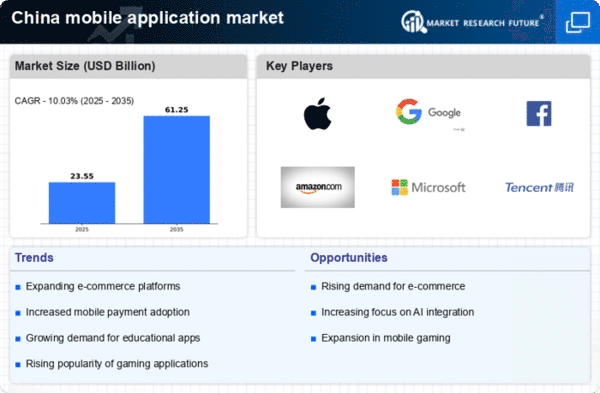Rising Demand for Mobile Gaming
The mobile application market in China is witnessing a dramatic increase in demand for mobile gaming applications. As of November 2025, the gaming segment accounts for over 50% of the total revenue generated by mobile applications, reflecting a robust consumer interest in interactive entertainment. The proliferation of high-speed internet and advanced mobile devices has enabled developers to create more sophisticated gaming experiences, attracting a diverse audience. This trend is further fueled by the growing popularity of esports and competitive gaming, which has the potential to drive additional revenue streams within the mobile application market.
Surge in Mobile Internet Penetration
The mobile application market in China experiences a notable surge in mobile internet penetration, which is a critical driver for growth. As of November 2025, mobile internet users in China exceed 1 billion, representing approximately 70% of the population. This widespread access to mobile internet facilitates the adoption of various applications across sectors such as e-commerce, social media, and entertainment. The increasing availability of affordable smartphones further enhances this trend, allowing a broader demographic to engage with mobile applications. Consequently, developers are incentivized to create innovative solutions tailored to the needs of this expanding user base, thereby propelling the mobile application market forward.
Government Support for Digital Economy
The mobile application market in China benefits significantly from government initiatives aimed at bolstering the digital economy. The Chinese government has implemented various policies to promote technological innovation and digital entrepreneurship, which includes substantial investments in infrastructure and research. For instance, the '14th Five-Year Plan' emphasizes the importance of digital transformation across industries, potentially leading to a projected growth rate of 15% in the mobile application sector by 2026. This supportive environment encourages startups and established companies alike to invest in mobile application development, thereby enhancing the overall market landscape.
Shift Towards Subscription-Based Models
The mobile application market in China is experiencing a notable shift towards subscription-based revenue models. This trend is particularly evident in sectors such as streaming services, productivity tools, and gaming applications. As consumers become more accustomed to paying for premium content and services, developers are adapting their monetization strategies accordingly. Reports indicate that subscription revenues in the mobile application market could reach $20 billion by 2026, highlighting the potential for sustained growth. This shift not only benefits developers through predictable revenue streams but also enhances user engagement by providing continuous updates and new features.
Increased Focus on User Experience and Design
The mobile application market in China places a heightened emphasis on user experience and design, which serves as a crucial driver for market growth. As competition intensifies, developers recognize the importance of creating intuitive and visually appealing applications to attract and retain users. Research indicates that applications with superior user interfaces can experience up to 30% higher engagement rates. This focus on design extends to various sectors, including e-commerce and social networking, where user satisfaction directly correlates with retention and revenue. Consequently, the mobile application market is likely to see continued investment in user experience enhancements.
















